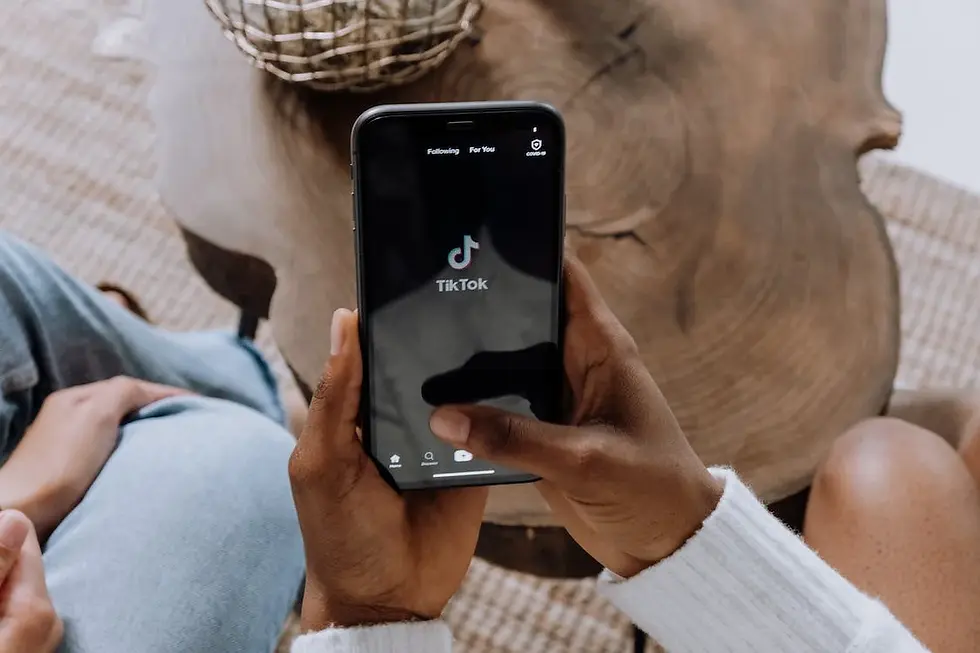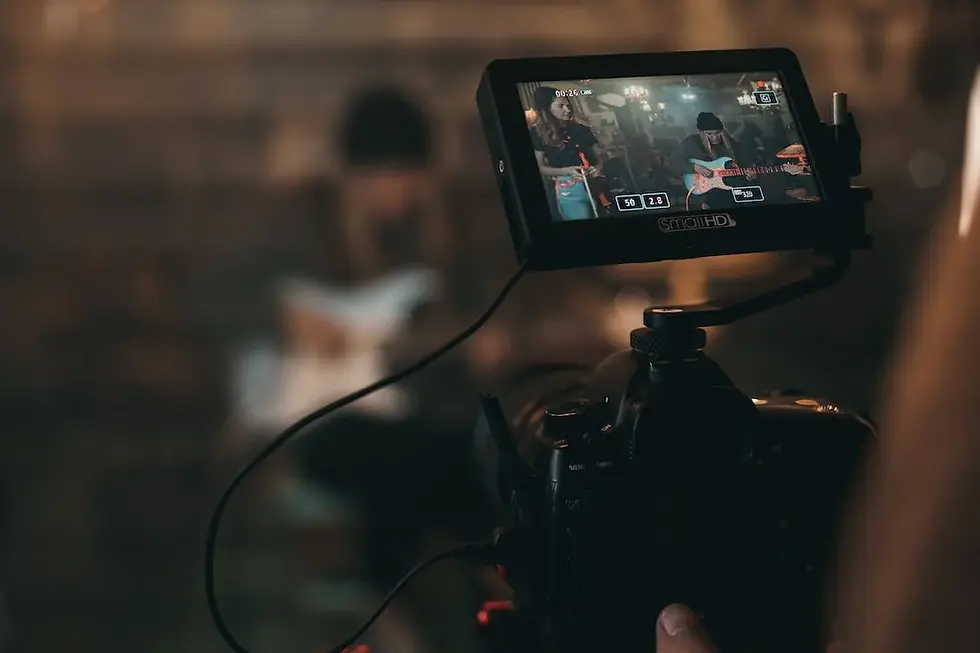The Impact of Social Media on the Music Industry:
- The Moolah Team
- May 1, 2023
- 14 min read
Social media has revolutionized the way that artists promote their music and connect with fans.
In this blog post, explore the ways that social media has transformed the music industry, from viral hits to crowdfunding and fan engagement.
I. The Impact of Social Media on the Music Industry: An Introduction
Social media has fundamentally transformed the music industry in ways that were unimaginable just a few decades ago. Artists no longer need to rely solely on record labels and radio play to reach new audiences and build a fanbase. With the rise of social media platforms like Facebook, Twitter, Instagram, TikTok, and YouTube, musicians now have a plethora of tools at their disposal to promote their music, connect with fans, and build their careers.
One of the most significant impacts of social media on the music industry is the rise of viral hits. A viral hit is a song or music video that gains massive popularity through social media sharing and other forms of online distribution. Social media platforms have made it easier than ever for artists to share their music with a global audience, and viral hits have become one of the most effective ways for up-and-coming musicians to gain exposure and build a fanbase.
Another way that social media has transformed the music industry is through crowdfunding and fan engagement. Crowdfunding platforms like Kickstarter and Patreon have made it possible for artists to fund their projects directly through their fans, cutting out the middleman of record labels and other gatekeepers. Meanwhile, social media platforms have made it easier for artists to engage with their fans on a personal level, building a community of loyal supporters and creating a sense of connection and shared identity.
Building a brand is another essential aspect of success in the music industry, and social media has become an essential tool for artists looking to establish themselves and differentiate their sound and image from their peers. By leveraging the power of social media, artists can build a brand that resonates with fans, creating a sense of identity and personality that goes beyond just their music.
Collaboration and community are also vital aspects of the music industry, and social media has made it easier than ever for artists to connect with other musicians, producers, and collaborators. Social media platforms like Twitter and Instagram have become virtual meeting places for artists, where they can share ideas, collaborate on projects, and build relationships that lead to new opportunities and collaborations.
While social media has presented many opportunities for artists in the music industry, it has also presented its fair share of challenges. Issues of copyright infringement, fair compensation for artists, and the impact on album sales have all been hotly debated in recent years. However, despite these challenges, social media remains an essential part of the music industry ecosystem, and artists who can navigate these challenges and opportunities are poised for success in the years to come.
In conclusion, social media has revolutionized the music industry in ways that were unthinkable just a few decades ago. From the rise of viral hits to crowdfunding, fan engagement, brand building, and collaboration, social media has opened up new avenues for artists to build successful careers and connect with fans around the world. As the music industry continues to evolve in the social media age, it will be essential for artists and industry professionals to stay ahead of the curve, leveraging new technologies and strategies to build successful careers and connect with audiences around the world.

II. The Rise of Viral Hits: How Social Media is Transforming the Way Music is Discovered
One of the most significant impacts of social media on the music industry is the rise of viral hits. A viral hit is a song or music video that gains massive popularity through social media sharing and other forms of online distribution. These songs are often catchy, memorable, and shareable, and they have become one of the most effective ways for up-and-coming musicians to gain exposure and build a fanbase.
Before the rise of social media, the traditional path to success in the music industry was through radio play and record label promotion. However, social media platforms like YouTube, TikTok, and Instagram have democratized the process of music discovery, allowing anyone with an internet connection to share their music with a global audience.
One of the most significant examples of a viral hit in recent years is Lil Nas X's "Old Town Road." The song, which combines elements of country and hip-hop, gained massive popularity on the social media platform TikTok before being picked up by traditional radio and record labels. The success of "Old Town Road" is a testament to the power of social media in creating viral hits and building successful music careers.
Another example of the power of social media in music discovery is the rise of K-pop. K-pop, or Korean pop music, has exploded in popularity in recent years, thanks in large part to the influence of social media platforms like YouTube and Twitter. K-pop artists like BTS, Blackpink, and Twice have amassed millions of fans around the world, thanks to their innovative music videos, catchy hooks, and social media savvy.
The rise of viral hits has also presented new challenges for the music industry, particularly in the area of copyright infringement. With so many users sharing and remixing music on social media platforms, it can be challenging for artists and labels to track and control the use of their music. Additionally, the rise of viral hits has disrupted the traditional model of album sales, with many artists choosing to release singles and EPs rather than full-length albums.
Despite these challenges, the rise of viral hits has opened up new opportunities for up-and-coming musicians to gain exposure and build successful careers. By leveraging the power of social media, artists can reach a global audience with their music and build a fanbase without relying on traditional gatekeepers like record labels and radio stations.
In conclusion, the rise of viral hits is just one example of how social media is transforming the music industry. By democratizing the process of music discovery, social media platforms have opened up new opportunities for up-and-coming musicians to build successful careers and connect with fans around the world. As the music industry continues to evolve in the social media age, it will be essential for artists and industry professionals to stay ahead of the curve, leveraging new technologies and strategies to build successful careers and connect with audiences around the world.

III. The Power of Crowdfunding: How Social Media is Changing the Way Music is Funded
Another significant impact of social media on the music industry is the rise of crowdfunding. Crowdfunding is a way for artists and musicians to raise money directly from their fans and supporters, often through online platforms like Kickstarter or Patreon. This method of fundraising has become increasingly popular in the music industry, allowing artists to finance their projects without relying on traditional funding sources like record labels or investors.
One of the most significant benefits of crowdfunding is that it allows artists to maintain control over their creative projects. By funding their work directly through their fans, artists can maintain creative control and produce music that is true to their artistic vision. Additionally, crowdfunding allows artists to build a closer relationship with their fans, creating a community of supporters who are invested in their work.
One of the most successful examples of crowdfunding in the music industry is Amanda Palmer's Kickstarter campaign for her album "Theatre Is Evil." Palmer, who was previously signed to a major record label, decided to fund her new album through Kickstarter, asking her fans to contribute money in exchange for exclusive merchandise, experiences, and access to the creative process. The campaign was a massive success, raising over $1.2 million and allowing Palmer to produce the album on her own terms.
Another successful crowdfunding platform for musicians is Patreon, which allows fans to support artists on a recurring basis, often in exchange for exclusive content or experiences. Patreon has become an increasingly popular funding source for independent musicians, allowing them to earn a steady income and build a community of dedicated fans.
The rise of crowdfunding has also presented new challenges for the music industry, particularly in the area of sustainability. While crowdfunding can be an effective way for artists to fund individual projects, it may not provide a stable income over the long term. Additionally, crowdfunding campaigns can be time-consuming and require significant effort on the part of artists to maintain engagement with their fans and supporters.
Despite these challenges, crowdfunding has opened up new opportunities for artists to fund their work and maintain creative control over their projects. By leveraging the power of social media and online platforms, musicians can build a community of dedicated fans who are invested in their work and willing to support them financially.
In conclusion, crowdfunding is just one example of how social media is transforming the music industry. By providing a direct funding source for artists and musicians, crowdfunding is changing the way that music is funded, produced, and distributed. As the music industry continues to evolve in the social media age, it will be essential for artists and industry professionals to explore new funding models and strategies to build successful careers and connect with audiences around the world.

IV. Fan Engagement: Building Communities and Connecting with Audiences through Social Media
Social media has revolutionized the way that musicians connect with their audiences, providing new opportunities for fan engagement and community building. Platforms like Twitter, Instagram, and Facebook have become essential tools for musicians to promote their work, share their creative process, and interact with fans in real-time.
One of the most significant benefits of social media for musicians is the ability to build a community of dedicated fans. By sharing behind-the-scenes glimpses into their creative process, responding to fan comments and messages, and sharing their personal lives, musicians can create a personal connection with their audience that was previously impossible. This connection can lead to increased fan loyalty, more merchandise sales, and even more concert tickets sold.
Another way that social media has transformed fan engagement in the music industry is through the use of live streaming. Platforms like Twitch and YouTube allow musicians to broadcast live performances and Q&A sessions to fans around the world, providing an intimate and interactive experience that was previously only available to fans who could attend concerts in person.
Social media has also opened up new opportunities for musicians to collaborate with fans and other artists. Platforms like SoundCloud and Bandcamp allow musicians to share their work with other artists, providing opportunities for remixes and collaborations. Additionally, social media can be a powerful tool for crowdsourcing ideas and feedback, allowing musicians to get real-time feedback from their fans and supporters.
However, while social media has opened up new opportunities for fan engagement, it has also presented new challenges for musicians. One of the biggest challenges is the need to maintain a consistent and authentic online presence. Musicians must balance their personal lives with their professional careers, carefully curating their social media accounts to provide a glimpse into their creative process without oversharing or alienating fans.
Additionally, social media can be a double-edged sword when it comes to fan engagement. While it can provide a powerful tool for building a community and connecting with fans, it can also lead to negative comments and online harassment. Musicians must be prepared to deal with negative feedback and criticism while also maintaining a positive and constructive online presence.
In conclusion, social media has transformed the way that musicians engage with their fans, providing new opportunities for community building, collaboration, and real-time interaction. While it presents new challenges and requires careful curation and management, social media has become an essential tool for musicians to build successful careers and connect with audiences around the world. As the music industry continues to evolve in the social media age, it will be essential for musicians to continue exploring new and innovative ways to engage with their fans and build sustainable careers.

V. Crowdfunding: Empowering Musicians and Fans Alike
In recent years, crowdfunding has become an increasingly popular way for musicians to fund their projects and connect with fans. Crowdfunding platforms like Kickstarter, Indiegogo, and GoFundMe provide musicians with a way to raise funds directly from their fans, bypassing traditional record labels and other intermediaries.
One of the primary benefits of crowdfunding for musicians is the ability to maintain creative control over their work. By funding their projects directly from fans, musicians are able to create the music they want to create without worrying about satisfying the demands of record labels or other investors.
Crowdfunding also provides musicians with a way to build a loyal and dedicated fan base. By offering exclusive rewards and behind-the-scenes access to their creative process, musicians can create a sense of community and engagement with their fans that was previously impossible. This engagement can lead to increased fan loyalty, more merchandise sales, and even more concert tickets sold.
For fans, crowdfunding provides a unique opportunity to directly support the artists they love. Rather than simply purchasing a CD or concert ticket, fans can contribute to the creation of new music and other creative projects, and feel a sense of ownership and investment in the process.
However, while crowdfunding has many benefits, it also presents some challenges for musicians. One of the biggest challenges is the need to effectively market and promote their crowdfunding campaigns. With so many projects competing for attention on crowdfunding platforms, it can be difficult for musicians to stand out and attract the support they need to fund their projects.
Another challenge is the need to balance the demands of crowdfunding with the demands of creating music. Running a successful crowdfunding campaign requires a significant amount of time and effort, which can detract from the creative process and lead to burnout.
In conclusion, crowdfunding has become an essential tool for musicians to fund their projects and connect with fans. By providing a way to maintain creative control and build a dedicated fan base, crowdfunding has empowered musicians to create the music they want to create and build sustainable careers outside of the traditional music industry. While it presents some challenges, the benefits of crowdfunding for musicians and fans alike are clear, and it is likely to continue to play an increasingly important role in the music industry in the years to come.

VI. Social Media and Fan Engagement: Building Communities and Fostering Loyalty
Social media has revolutionized the way musicians connect with their fans, offering a range of new opportunities for engagement and interaction. By building communities on platforms like Facebook, Twitter, Instagram, and TikTok, musicians can cultivate a sense of loyalty and connection with their fans that was previously impossible.
One of the primary benefits of social media for musicians is the ability to connect with fans in real time. Musicians can post updates, share new music and videos, and engage with their fans directly, building a relationship that goes beyond the music itself. This engagement can lead to increased fan loyalty, more merchandise sales, and even more concert tickets sold.
Social media also provides musicians with a way to showcase their personalities and share their creative process with fans. By sharing behind-the-scenes photos and videos, musicians can create a sense of intimacy and connection with their fans, allowing them to feel like they are part of the creative process.
In addition to building relationships with existing fans, social media can also help musicians reach new audiences. By using hashtags and other social media tools, musicians can tap into wider communities of fans and connect with people who may not have heard of them otherwise.
However, as with crowdfunding, social media also presents some challenges for musicians. One of the biggest challenges is the need to stay engaged and active on multiple platforms, which can be time-consuming and overwhelming. In addition, the constant pressure to post updates and engage with fans can lead to burnout and creative fatigue.
Another challenge is the need to navigate the complex landscape of social media algorithms and advertising. With so much competition for attention on social media, it can be difficult for musicians to reach their target audience and stand out from the crowd.
In conclusion, social media has transformed the way musicians connect with their fans, offering new opportunities for engagement and interaction. By building communities on social media platforms, musicians can create a sense of loyalty and connection with their fans that was previously impossible. While it presents some challenges, the benefits of social media for musicians and fans alike are clear, and it is likely to continue to play an increasingly important role in the music industry in the years to come.

VII. The Future of Social Media and Music
The impact of social media on the music industry has been significant and far-reaching, but what does the future hold? As technology continues to evolve and new platforms emerge, the role of social media in the music industry is likely to continue to change and expand.
One trend that is likely to continue is the use of social media for fan engagement and interaction. Musicians will continue to use social media to build communities, share behind-the-scenes content, and connect with fans in real time. As virtual reality and other immersive technologies become more accessible, we may even see musicians using social media to create fully immersive fan experiences.
Another trend is the continued growth of streaming services like Spotify and Apple Music. As these services become increasingly popular, musicians will need to focus on cultivating a strong presence on these platforms in order to reach new audiences and build their fan base.
Social media is also likely to continue to play a role in music discovery, with platforms like TikTok and Instagram providing new opportunities for musicians to go viral and reach new audiences. However, as these platforms become more saturated and competitive, it will become increasingly important for musicians to be strategic in their approach to social media and focus on building engaged and loyal fan bases rather than chasing viral success.
Finally, social media is likely to continue to play a role in crowdfunding and direct-to-fan sales. As musicians seek to retain control over their creative work and revenue streams, they may turn to social media to sell merchandise, offer exclusive content, and raise funds for new projects.
In conclusion, the future of social media in the music industry is exciting and full of potential. As technology continues to evolve and new platforms emerge, musicians will have new opportunities to connect with fans, reach new audiences, and control their creative work and revenue streams. While there are certainly challenges and risks associated with social media, the benefits are clear and the potential for innovation and growth is enormous.

VIII. Conclusion: Social Media's Lasting Impact on the Music Industry
Social media has undoubtedly transformed the music industry in numerous ways, from the way that artists promote their work and engage with fans, to the way that music is discovered, consumed, and monetized. While there are certainly challenges associated with social media, the benefits are clear, and the impact of social media on the music industry is likely to be felt for years to come.
One of the most significant impacts of social media on the music industry is the way that it has shifted the balance of power away from record labels and towards individual artists. In the past, record labels held a near-monopoly on the music industry, controlling everything from the production and distribution of music to artist promotion and marketing. But with the rise of social media, individual artists now have the ability to connect directly with fans, build their own brands and followings, and even crowdfund their own projects.
Another major impact of social media on the music industry is the way that it has changed the way that music is discovered and consumed. In the past, radio play and record sales were the primary drivers of music success, but today, social media platforms like TikTok and Instagram can help turn unknown artists into overnight sensations. This has led to a democratization of the music industry, where talented artists from all over the world can find success on their own terms, without relying on the traditional gatekeepers of the industry.
In addition to democratizing the music industry, social media has also helped to build more engaged and loyal fan bases. Musicians can now connect directly with fans, share behind-the-scenes content, and even collaborate with fans on new projects. This has led to a more authentic and personal relationship between musicians and fans, with fans feeling more invested in the success of their favourite artists.
While social media has certainly had a positive impact on the music industry, there are also risks and challenges associated with these platforms. The rise of social media has led to a saturation of content, with millions of artists vying for attention and success. This has made it more difficult for individual artists to stand out and find success on their own terms, and has led to a focus on viral hits and short-term success rather than long-term growth and sustainability.
Overall, the impact of social media on the music industry has been both significant and far-reaching, with the potential to transform the industry in ways that we cannot yet imagine. As technology continues to evolve and new platforms emerge, it will be interesting to see how musicians adapt and continue to use social media to connect with fans, build their careers, and shape the future of the music industry.
In conclusion, social media has had a significant impact on the music industry, transforming the way artists promote their music and interact with fans. From viral hits to crowdfunding and fan engagement, social media has revolutionized the way that the music industry operates. As we move forward, it will be exciting to see how artists continue to utilize social media to reach their fans and build their careers. Thank you for reading, and if you enjoyed this post, be sure to subscribe to our newsletter for more insights and updates on the intersection of music and technology.
Thanks a million,
Moolah







Comments